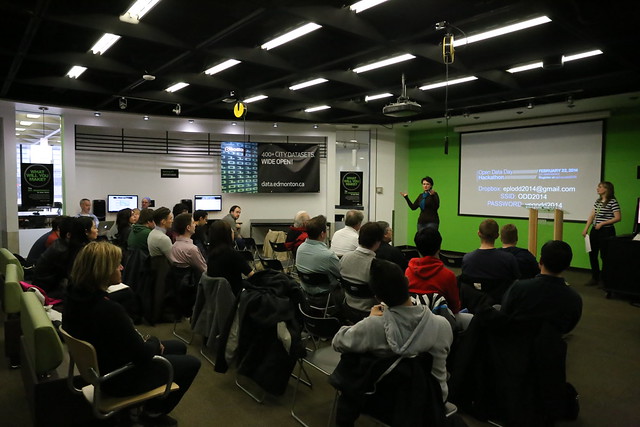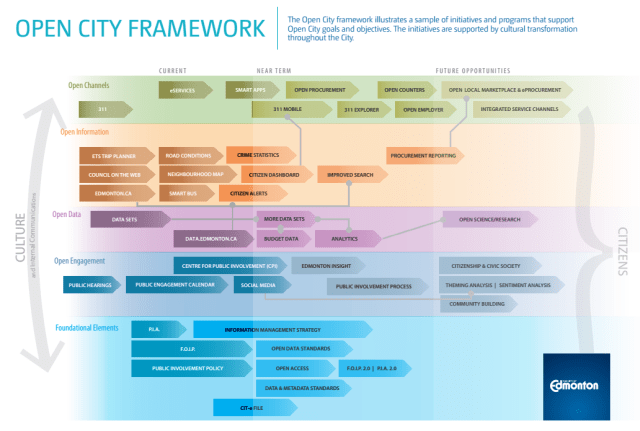After a few years of stagnation, I feel like open data in Edmonton is exciting again. This has been a great year for open data and open government in our city! Here’s an update on what’s been happening.
International Open Data Day really kicked things off back in February with a hackathon hosted by EPL at the new Makerspace. It was a great opportunity for developers to come together to take a fresh look at the municipal, provincial, and federal data catalogues, all of which have grown considerably in the last year or so.
In May, a group of interested citizens organized a hackathon called HackYEG. Mayor Iveson spoke at the event which was a great success and led to a number of really interesting projects. The event also led to a new citizen meetup, called Open Edmonton. The group was started by Lydia Zvyagintseva and David Rauch and meets at Startup Edmonton on the third Wednesday of every month. Follow them on Twitter for the latest events and other “open” news.
The City of Edmonton unveiled its Open City Initiative in June, which highlighted a number of principles, goals, and objectives that will help to make Edmonton an Open City. It’s heavy on talk and light on action, but it signals a renewed effort on the part of the City to support open data and related initiatives. Importantly, it also opened the door to a policy on open data and open government, which would change the dynamic inside the City from “we could support this” to “we must support this.”
The federal government began a series of consultations in February this year to gather input on Canada’s Action Plan on Open Government 2.0. Edmonton was included in those consultations, with a roundtable event that took place on August 27. Treasury Board President Tony Clement hosted the session that was attended by representatives from the City of Edmonton, Province of Alberta, industry, and the community at large.

Treasury Board President Tony Clement
MP Clement was also in Edmonton talking about open data last year, gathering input for the 1.0 verson of the plan. The draft 2.0 plan will be available for review and comment starting October 6.
At the end of August, I think open data scored a small but important victory when the results of the 2014 Municipal Census were made available. For the first time, the data was in the open data catalogue at the same time as it was released to the public in PDF and via the media. A sign that the Open City Initiative is being taken seriously, perhaps?
Earlier this month Edmonton hosted a stop on the cross-Canada motorcycle tour on open government undertaken by Richard Pietro. The whole idea behind the tour was to “ignite conversation about open government and open data” and to “encourage citizens to become more civically engaged.” A number of local advocates spoke at the event, which highlighted some of the success Edmonton has had with regards to open data. Here’s a recap from Richard himself.
Last week I was one of five speakers at the Lunchalytics event focused on open data. Chris Moore, Eugene Chen, Mark Diner, and Michael Parkatti also spoke about open data and analytics. The room was packed and some really great projects and initiatives were highlighted, such as the Alberta Economic Dashboard. There’s clearly a growing interest in such visualizations and tools.
Later this week I’m speaking at the Right to Know Forum, hosted by Alberta’s Information and Privacy Commissioner Jill Clayton. The event will feature presentations on right to access, information management, open data initiatives, and the benefits of open data. It’s a sign of just how far open data has come that OIPC is hosting a forum on the topic!
Throughout the year, the various data catalogues have been growing. And it’s not just Canada, Alberta, and Edmonton that are making datasets available. Other communities in the Edmonton Region are getting behind open data too, like the County of Strathcona which now has more than 100 datasets available to citizens. Even St. Albert has started experimenting with open data, through its Property Search tool (which allows you to export the data).
I know that some Edmontonians, like Matthew Dance, Chris Moore, and Mark Diner, have always been local open data advocates, even and especially during the years I’m calling stagnant. But lately it’s refreshing to see an entirely new group of Edmontonians getting involved. Just this evening I was at a meeting in which the City’s open data catalogue was referenced (and not by me!). There’s a growing awareness and interest that is encouraging.
If you’ve been on the fence about open data or have been thinking about learning more, now’s the time. Check out Open Edmonton and get involved!



Mack, great summary of what has happened – there is still so much more that can be done – lets hope the people who control the information see the value in releasing more and more and that people take up the challenge to use the information to move the city forward – City Building is not only physical infrastructure that you can see and feel it is also the things you cannot see that impact all of us